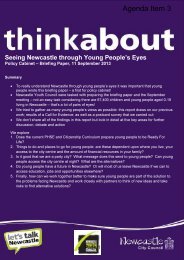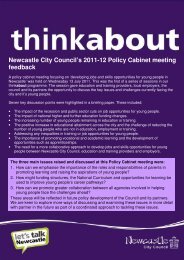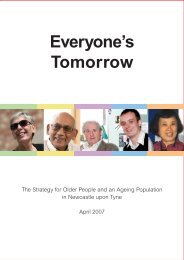NEWCASTLE'S MUSICAL HERITAGE AN INTRODUCTION By ...
NEWCASTLE'S MUSICAL HERITAGE AN INTRODUCTION By ...
NEWCASTLE'S MUSICAL HERITAGE AN INTRODUCTION By ...
You also want an ePaper? Increase the reach of your titles
YUMPU automatically turns print PDFs into web optimized ePapers that Google loves.
CHAPTER SIXTEEN<br />
NEW BEGINNINGS<br />
Concert life in Newcastle by the 1950s fell into a pattern, which produced few<br />
surprises. In the theatre there was the annual visit of the Carl Rosa Opera and<br />
the occasional ballet company. At the City Hall there were regular seasons of<br />
orchestral concerts by the Halle, The Liverpool and the Yorkshire Orchestras<br />
playing the standard repertoire. Interspersed between these regular orchestral<br />
concerts were visits by solo artists on the touring circuit, some of whom came a<br />
number of years running, others who gave one performance and were never<br />
seen again. The same people went to the same concerts and the size of the<br />
audience depended upon whether the artist appearing was a star personality –<br />
someone who had appeared in a Hollywood musical film or was a big name and<br />
sold a lot of records – which meant that for most of the routine orchestral<br />
concerts and more familiar artists there were often empty seats. Image rather<br />
than merit was the criteria by which the average music lover decided whether or<br />
not to spend his or her 3/6 (20p) on a seat at the City Hall. Oddly enough this in<br />
essence was the very thing the writer in the Musical Times complained about<br />
back in 1914, which seems also to have been a criticism made in the 19 th<br />
century. Hey-ho! Not all the big names that toured the country came to<br />
Newcastle. Why some did and others preferred not to remains a mystery. The<br />
climate was certainly a factor when it came to opera singers from the sunnier<br />
climes. One of my greatest disappointments was when Tito Schipa, tenor, and<br />
master of Bel Canto, cancelled his 1950s visit for reasons of climate and the<br />
effect it might have on his voice. Poor bookings would have been another factor<br />
– by the 1950s Newcastle’s image as a cultural town was considerably<br />
diminished. It relied entirely on the outside world for its music. It had no orchestra<br />
of its own and the irony of the situation was that the ratepayers of Newcastle<br />
were subsidising the Halle Orchestra from Manchester. A leaflet announcing the<br />
orchestra’s forthcoming 1953-54 Season reads;<br />
‘The concerts given last Season attracted large but not “capacity” audiences.<br />
However, the season as a whole cannot be regarded as unsatisfactory. And it is<br />
most gratifying to record that the Newcastle Corporation has recognised whereby<br />
the loss on the Season was kept within reasonable bounds. The Society is most<br />
grateful to the Corporation and hopes that that body will make its grant an annual<br />
one the better to ensure the continued visits of this world-famous Orchestra and<br />
its equally eminent Conductor’.<br />
The Halle’s eminent conductor, apparently not content with being subsidised by<br />
the Newcastle City Council (and the Arts Council) used to harangue his captive<br />
102

















